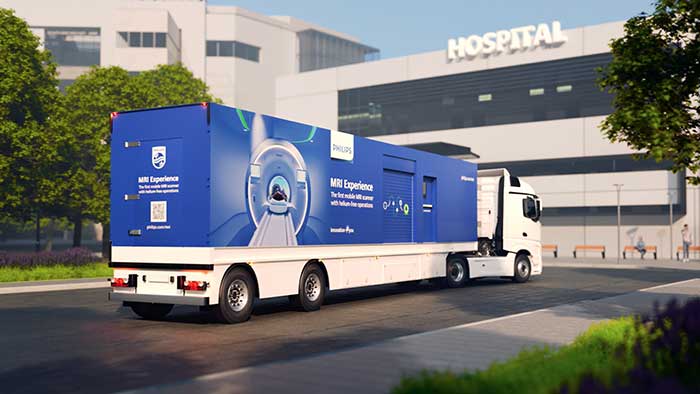Bridging gaps in healthcare access through innovation and collaboration
Sep 17, 2025 | 4 minute read
From mobile health units in the Australian outback to digital solutions in the rural southeast United States and beyond, innovative approaches are presenting new ways to deliver healthcare around the world. Through collaboration, new service models and digital transformation, the healthcare industry is advancing resilient and equitable systems that reach more patients in underserved and remote communities.
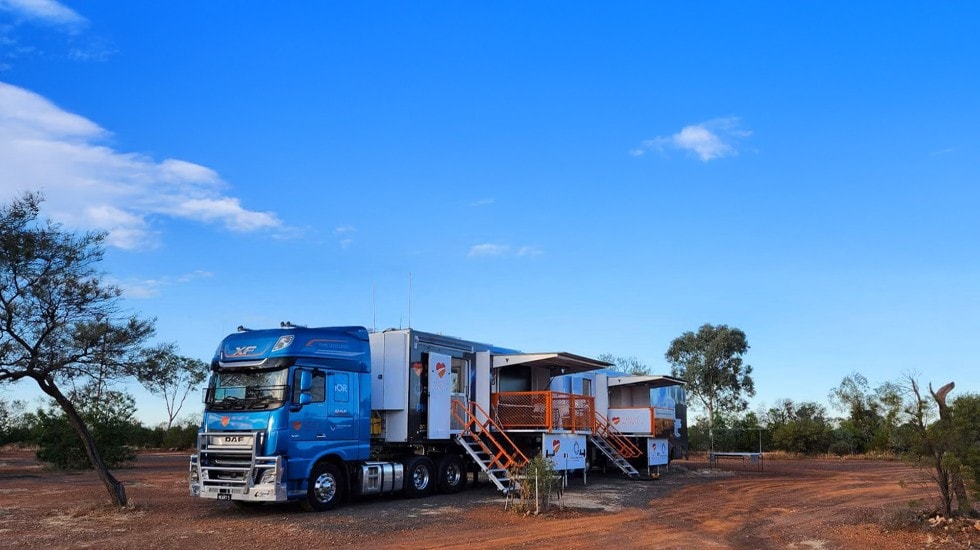
In the remote reaches of Queensland, Australia, miners work in off-road locations that lack a stable electricity supply, posing significant challenges for health screenings. In the outback, these miners face higher risks of developing lung cancer and respiratory diseases, where early detection is key for better health outcomes. Today, thousands of miners and their family members are receiving comprehensive health assessments that could lead to earlier treatment for conditions ranging from lung cancer to cardiovascular diseases. How? Thanks to six mobile CT units, designed by Philips in collaboration with front-line specialist medical service provider Heart of Australia. The world’s first solar and battery powered low-dose CT scanner housed in a customized truck is supported by remote clinicians who can view scans within minutes, make a diagnosis, and decide on the best treatment for the patient. The Heart of Australia trucks are now providing lung cancer screening services across Australia under a new government screening program, enabling better care for more people.
Around the world, communities like these are benefiting from a transformative shift in healthcare delivery. As populations grow and age, the demand for healthcare services increases, creating widening disparities, particularly in remote or lower-income regions [1]. The surge in chronic illnesses [2], coupled with limited resources, exacerbates these disparities. Recent health and environmental crises [3], along with global conflict, further highlight the urgent need for resilient healthcare systems and ensuring that everyone has the same opportunity for quality healthcare access. In response, the healthcare industry is innovating and collaborating to develop solutions that bridge these critical gaps.
Innovating for patient-centered care
Improving access to healthcare starts with taking a holistic approach to providing care. Philips is committed to addressing challenges in healthcare access through patient-centric innovation. We focus on creating solutions that connect more patients to the care they need. We are seeking to overcome barriers that prevent people from enjoying good health and aim to make it easier for healthcare professionals to provide that care. This means going beyond hospital walls and developing new healthcare solutions and digital business models. Deep collaboration with public and private partners is also critical to help provide life-saving healthcare technologies and services to more people, especially in those areas where they are needed most.

For example, with more than 280 million people, Indonesia is the world’s fourth most populous nation. With a vast archipelago of over 17,000 islands, the country faces significant challenges in ensuring equitable access to healthcare. The country is also grappling with a surge in non-communicable diseases (NCDs) such as heart disease, stroke and cancer. And yet, advanced care for these illnesses remains largely centralized on the densely populated island of Java, leaving much of the country underserved. A new partnership between Indonesia’s Ministry of Health and Philips will establish a nationwide network of advanced image-guided therapy rooms, dramatically expanding access to minimally invasive treatments across hundreds of hospitals.
The multi-year initiative aims to transform the country’s treatment of heart disease, stroke and cancer – Indonesia’s leading causes of death – expanding access to care and benefiting millions of patients.
Driving digital transformation to support better access to care
Digital transformation is at the heart of our approach to improve healthcare access and equity. Thanks to remote patient monitoring, virtual collaboration, and other emerging digital technologies, much of the care that has traditionally been delivered in hospitals can move into lower-cost settings that are more easily accessible and convenient for the patient – such as ambulatory centers, retail clinics and the home.
We’re leveraging technologies like artificial intelligence (AI) and health informatics to improve efficiency and productivity in healthcare and enhance the patient experience. Health information technologies, including telehealth platforms, like tele-ultrasound, and digital health data systems, play crucial roles in supporting healthcare delivery and expanding access to needed healthcare services for rural residents. Digital transformation also addresses barriers such as health literacy and preventive care, ensuring that individuals receive care when they need it.
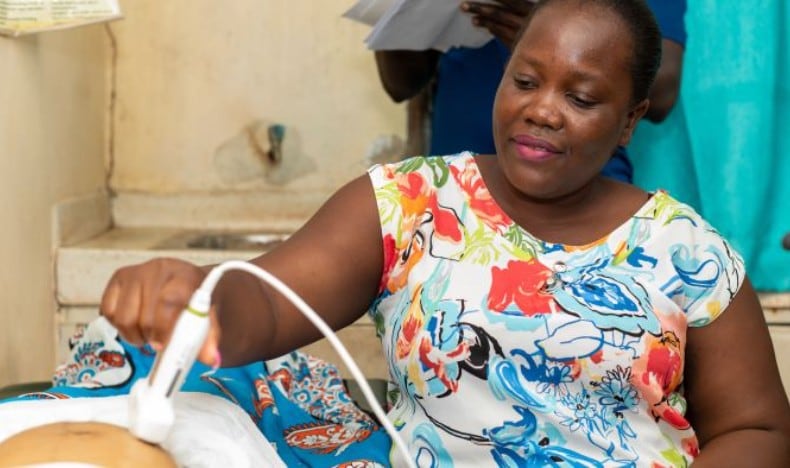
In rural communities, for instance, the health of women and newborns is jeopardized by the distances to clinics, lack of medical equipment for monitoring pregnancies, and a shortage of trained healthcare professionals. In 2023, approximately 92% of all maternal deaths occurred in low- and lower middle-income countries, with Sub-Saharan Africa accounting for around 87% [4]. Many of these deaths could have been prevented with access to skilled healthcare professionals, underscoring the essential role of digital transformation in bridging these critical gaps and saving lives.
Philips is developing and piloting an AI-enabled obstetric application that leverages the Philips Lumify Handheld Ultrasound device to support midwives and nurses in point-of-care decision-making, including timely referrals, and to help ensure consistent detection of high-risk pregnancies. In partnership with the Gates Foundation and research centers across the globe, this innovation – the Philips SmartSweep application – is designed to increase access to maternal health services and improve pregnancy outcomes through preventive services, especially in remote and underserved areas.
How new business models increase healthcare services
Innovating to improve healthcare access is much more than simply developing new products or solutions. It's also about new ways of delivering care and implementing these new business models to meet patients’ needs where they’re located and make healthcare more affordable.
Consider HeartPrint, a Philips healthcare venture in India designed to provide affordable and efficient cardiovascular diagnostics. HeartPrint empowers people to take care of their own heart health through preventive screening on mobile phones. When a user places a finger on their phone’s camera lens, HeartPrint measures heart rate and variability, respiratory rate, blood pressure and oxygenation. It then builds an early warning cardiac profile that medical professionals can use to determine emerging health risks and, if necessary, refer patients to primary care doctors or cardiologists for further care. Timely use of such personal health services and preventive medical care can support opportunities for better health outcomes. So far, HeartPrint has reached 100,000 people and offers a scalable, cost-effective model that can be adapted globally, potentially transforming cardiovascular care and improving health outcomes for millions.

Partnerships to deliver better care – and healthcare access – for more people
It takes an ecosystem of innovators, providers, payers and policymakers working together to develop, deliver and implement comprehensive solutions to mitigate healthcare challenges. These collaborations help ensure that innovative solutions reach those who need them most, improving overall health outcomes, whether for chronic diseases or for vulnerable conditions such as pregnancy.
Pregnant women living in 'maternal health deserts' in the US state of Georgia must travel long distances to access basic prenatal care, which is vital for healthy pregnancies and births. New innovative remote patient monitoring solutions are now expanding access to high-quality healthcare for high-risk pregnancies throughout the state in the convenience of their own homes, thanks to a partnership with the three Medicaid plans in the state of Georgia. The program gives pregnant and postpartum mothers with maternal hypertension and diabetes access to connected blood pressure monitors, blood glucose meters and scales. Licensed healthcare professionals provide personalized health coaching to participants, monitoring them and intervening to avoid possible complications. This initiative aims to significantly enhance maternal and newborn health outcomes, offering reassurance and improved health access to those who need it most, while also driving down the overall cost of providing maternal healthcare in the state.
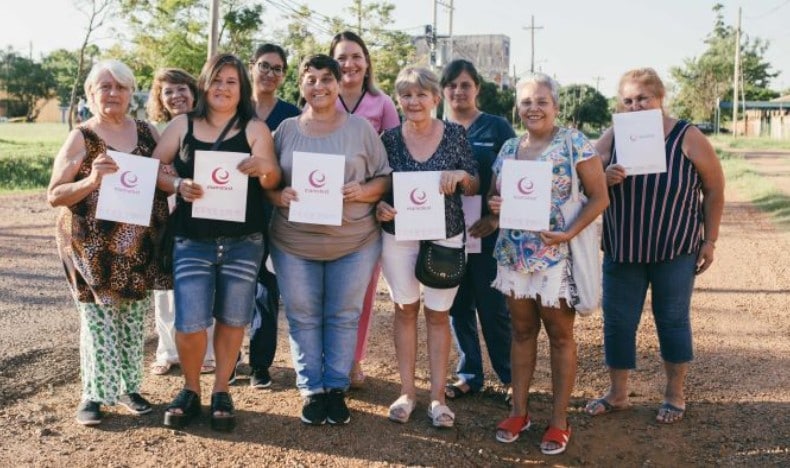
Copyright Mamotest. Argentina-based health tech venture Mamotest has developed an end-to-end digital platform harnessing AI that integrates screening, diagnosis, patient navigation and follow-up care for breast cancer.
Philips Foundation has taken another approach to expanding healthcare access. A strategic Philips partner, the Foundation has invested in a portfolio of early-stage health technology ventures with the potential to transform primary healthcare systems. Recently, it has expanded its efforts to India and Latin America – where the challenges for healthcare access are both urgent and systemic. For instance, investments in Last Mile Care, Briota and iKure represent a major step forward in the goal to provide access to quality healthcare by addressing gaps in managing NCDs, scaling digital primary care provider models, and delivering affordable diagnostic solutions to communities that are often excluded from traditional healthcare infrastructures. In Latin America, investments in Mamotest and Diagnostikare are focused on delivering digital health services and screening for NCDs, particularly in underserved semi-urban and rural populations.
How environmental sustainability in healthcare supports a future for healthy people
When it comes to building tomorrow’s health systems and expanding healthcare access, we continue to innovate with environmental sustainability in mind. Sustainable solutions require robust infrastructure and efficient resource use to deliver healthcare services responsibly. This means that we’re not only designing products that use less energy and generate less waste, but that we’re also applying responsible and sustainable AI and data principles to our cloud-, service- and software-based solutions. This approach enables remote interaction between patients and care givers, while reducing travel requirements and CO₂ emissions.
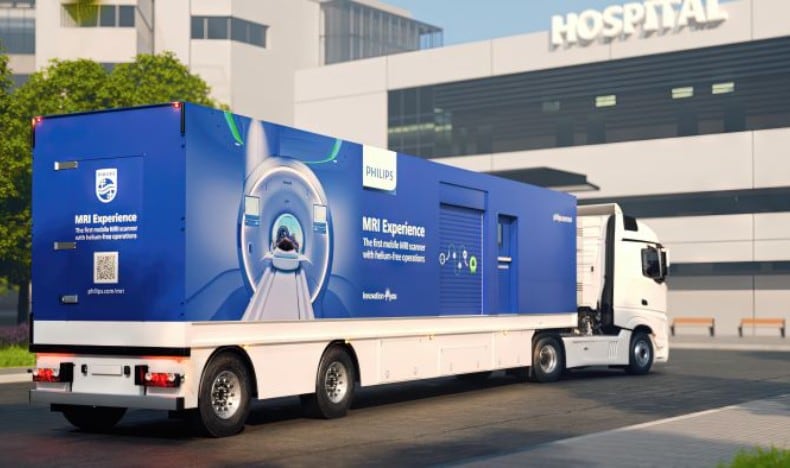
MRI scanners operating with helium-free technology are a prime example. Our flagship BlueSeal devices have saved over 5 million liters of helium, a vital yet scarce resource. Scanners with this innovative technology no longer require helium refills, enabling the creation of ‘hospitals on wheels’: trucks equipped with diagnostic imaging services like MRI, in addition to X-ray and CT, can bring critical care closer to remote communities and ensure that patients receive the care they need without having to travel long distances. For instance, our first mobile MRI truck in the Middle East, Türkiye and Africa region combines advanced technology, mobility and patient-centric features to enhance healthcare delivery in remote, difficult to access and underserved locations.
A rallying call to action for achieving health equity – and better access to health
Philips’ commitment to social impact has already seen its health technology improve the lives of nearly 2 billion people annually, with the goal of reaching 2.5 billion lives by 2030. To achieve this, we need concerted action across the healthcare ecosystem. We must continue to innovate, collaborate and act with urgency to build more equitable and sustainable healthcare systems.
We invite healthcare decision-makers across the healthcare value chain to join us in this mission. By working together, we can improve access to care and the overall resilience of our healthcare systems.
Let's create a future where everyone, no matter who you are or where you live, can access the quality healthcare you need. Together, we can make a lasting difference.







